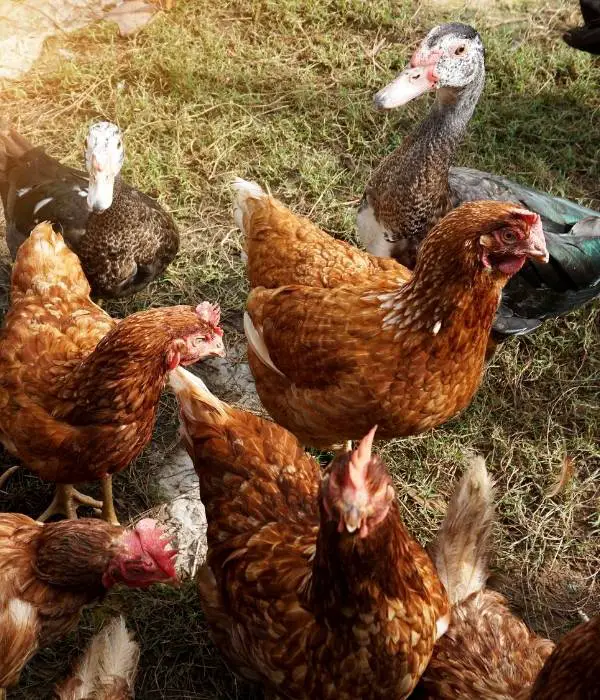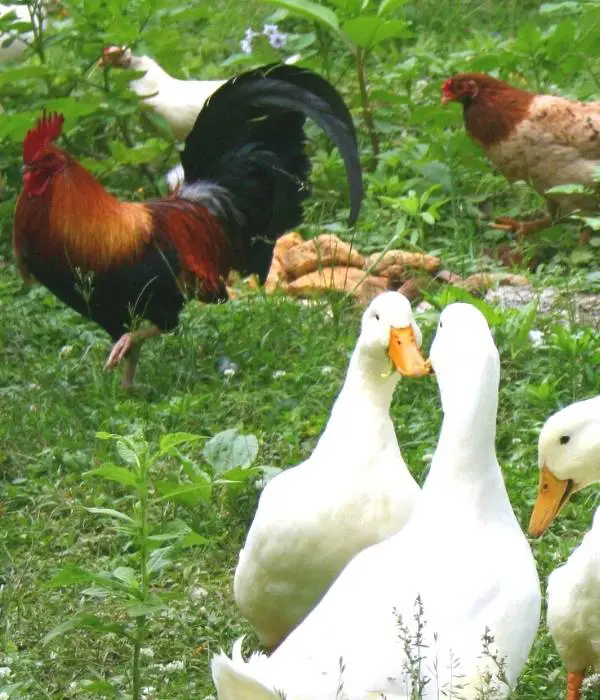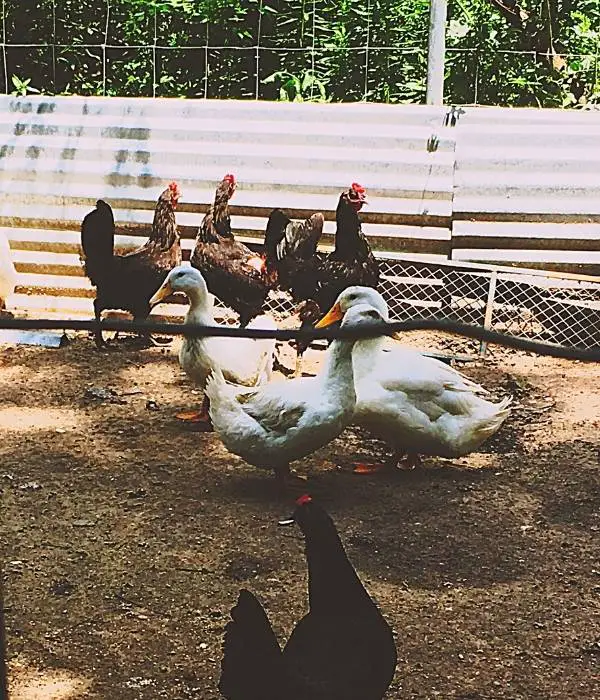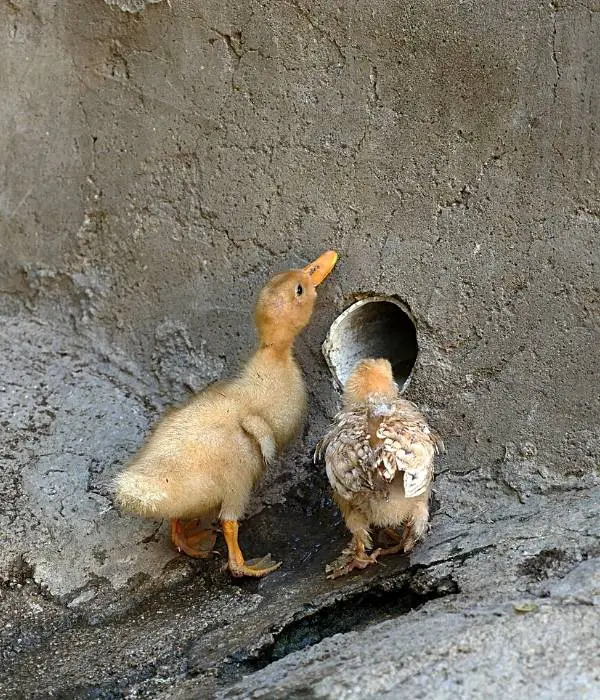
Can chickens and ducks live together? Well, it’s an interesting question for most homesteaders.
Raising Chickens and Ducks Together 101
Chickens and ducks independently reproduce, and, while they may eat each other if all of their resources are equal, there is no need for conflict between them. So, you need to know all about them before keeping them together.
Ducks and chickens can live together in the same pen, and they can even be used as providers of fertilizer and bug control for each other.
It is important for the owner of the farm or garden to properly allocate the size of the pen and make sure that adequate resources are provided for both types of poultry birds. Within a small area, it is possible for chickens and ducks to live together without conflict.
This guide will cover the benefits of having a mixture of chicken and duck, including examples of co-existing poultry types and recommendations for the size of their individual pens. A brief discussion on chickens vs. ducks will then follow.
What are the advantages of having a mixture of chicken and duck?

There are several advantages to having a mixture of chicken and duck. These include:
1. They create fertility within the garden
As mentioned above, chickens and ducks both work as fertilizers for the garden. While this is the main benefit that they bring to the table, both types of poultry also attract other insects to the area. This can be useful in increasing the fertility of your backyard soil.
2. They are a source of bug control for the other
Both chickens and ducks are effective bug predators. They eat fruit flies, houseflies, ants, desert termites, mosquitoes, and other flying insects. The presence of both types of poultry greatly reduces the problem of bugs breeding in the garden.
3. They provide different types of poultry products (eggs and meat)
A mixture of chickens and ducks produces eggs as well as meat. The different meat types that each poultry provides make this poultry mix popular for people who want a variety of meats.
4. The abundance of calorie content
Chickens and ducks are similar in this way, as they are both considered to be a good source of protein. This means that they have high-calorie content.
The high calorific content means that they can be raised in smaller spaces, making them less likely to compete for space.
What are the disadvantages of having a mixture of chicken and duck?
There are also several disadvantages to having a mixture of chicken and duck. These include:
1. They are more difficult to raise than some types of poultry
Ducks are easier to raise than their chicken counterparts. Chickens are more difficult to raise and require a much larger amount of land area.
This can cause a problem if there is only one type of poultry because they will both be competing for the same resource.
While both chickens and ducks cost relatively the same amount of money to feed, they do have slightly different nutritional qualities. Chickens have higher calorific content and are considered a better source of protein.
2. The birds are more prone to disease
Chickens and ducks are more susceptible to diseases than one type of poultry. Chickens tend to encounter diseases when they are young, while ducks tend to develop less easily than chickens.
3. They are more vulnerable to predators
Both chickens and ducks are susceptible to predators. In particular, foxes, raccoons, and coyotes will eat the eggs of both chickens and ducks. Dogs can also be a problem for both types of poultry.
4. They are susceptible to more predators
There are certain predators that are a risk to both chickens and ducks. Sparrowhawks, hawks, snakes, and weasels can find their way into the hen house or duck pen. Because of this, it is important to make sure that the area is inaccessible to these predators.
When raising the two types of poultry together, it is important to make sure that there is adequate space for them both.
This includes providing adequate height so that their bodies are not in contact with the floor. If they are kept within a small area, they will fight for food and other resources.
Chickens and ducks have different needs regarding space. It is also important to have a variety of land types so that the poultry types do not feel isolated from each other.
Water Requirements for Chicken Vs Ducks

a) Ducks
Ducks require access to water at all times. They need access to a large pool of water in which they can take baths as well as swim for exercise and entertainment.
Ducks also need a small pool of water nearby. This pool will be used by the ducks for bathing, swimming, and drinking.
b) Chickens
Chickens do not require as much access to water as ducks do. They can access water at any time from their poultry drinker.
Besides, chickens can access water through their food. They can get their daily amount of water through the vegetables, fruits, and other feeds that they consume on a daily basis.
Feed Requirement Chicken Vs Ducks
a) Ducks
Ducks require a large quantity of water and a large quantity of feed. This is because ducks are typically larger than chickens.
In addition, ducks require more calories than chickens. They also need more protein than chicken.
b) Chickens
Chickens have slightly different nutritional needs than ducks do. While they do require water and food every day, chickens can get a portion of their daily needs from the bugs that find their way into the chicken pen.
In addition to providing for various nutritional needs, both chickens and ducks are excellent for the garden due to their ability to be pest controllers.
Coop Building For Chickens Vs Ducks
In general, if you set up your pen in the same way that you normally would for ducks, the size of the chicken enclosure will not change. However, there are some things to keep in mind when building your chicken pen.
The width of the chicken pen should be twice the length of the ducks. This allows the chickens to escape from predators without having to run into danger. It also provides a place for them to turn around, as they are often unable to stop in time.
What are the requirements for the design of the chicken coop?
There are several other requirements for the chicken coop that are often overlooked. The measurements for the chicken coop should be at least 3 feet by 5 feet for 2-3 birds.
This allows for adequate space that is available for the chickens to move around as well as to turn around. For large coops, you need more space. Read our guide on “how much space do chickens need” for a better understanding.
It is important to also ensure that there are different heights in the coop. This allows the chickens to have a place to lay their eggs on a flat surface. In addition, it will also provide an area for them to perch and lay on nesting boxes.
The height of the coop should also be considered. It should be tall enough so that it is not easy for predators to get into the coop.
However, it should not be so tall that the chickens are unable to escape from predators or other dangers. Adding a chicken coop camera and automatic chicken coop doors will provide more security.
What are the requirements for the design of the duck coop?
The considerations for the design of the duck coop are similar to those for the chicken coop. The design should be at least 3 feet by 5 feet for 2 ducks. This will provide each duck with sufficient space to move around, as well as a place to lay their eggs if they wish.
The design should also provide enough space for the ducks to bathe, drink and get exercise. This is all provided through the design of the body of water.
It is important to ensure that the height of the duck coop is high enough to prevent other animals, such as raccoons, foxes, and coyotes, from accessing the ducks. However, it should be low enough to the ground that it is not hard for the ducks to exit their home.
Behavior of Chickens Vs Ducks

Ducks are also more intelligent than many people realize. The females will engage in a number of behaviors, including nesting and brooding their eggs.
This is an example of their intelligence, as they are able to keep track of the eggs as well as hatch them at the appropriate time.
There are some specific behaviors that ducks have that make them different from chickens. Ducks are quieter than chickens, making it harder for predators to hear them. This can have a significant impact on the success of your poultry farm.
Mating
Ducks have specific behaviors that are different from those of chickens. While ducks engage in the same behaviors that chickens do, including courtship and copulation, ducks often do it in a more private setting.
For instance, ducks will often mate behind closed doors or at night. This keeps their offspring safe from predators, who could easily access the ducklings if they were out in the open.
On the other hand, chickens often engage in the same behaviors during copulation that they would during the day. This makes the young chicks easy targets for predators and other dangers in the chicken coop or pen.
Eggs Laying
Ducks lay anywhere from 300 to 340 eggs per year. However, this is extremely dependent upon the species of duck. In addition, the amount of eggs that a duck lays is dependent upon the breed and type of feed that they are given.
Chickens lay approximately 180–300 eggs per year. This is dependent upon the breed, age of the chicken, and the size of the hen.
Hatching
The incubation period for a duck egg is 28 days. However, this varies greatly between species due to their genetic makeup. Male ducks and ducklings do not participate in the incubation process.
In comparison to chickens, ducks require more time to hatch their eggs. Chickens usually incubate their eggs for 21 days before they hatch. This is shorter than the common duck egg incubation period.
Brooding
Ducks tend to sit on their eggs more than chickens do. This is typically due to the fact that they are larger than chickens.
In addition, ducks are more likely to remain with their eggs during the initial stages of hatching, unlike chickens.
After hatching, ducks continue to brood their eggs as they grow. This reduces the chance that they will suffer from predators, who could easily find them and eat their babies if they are in the open.
Chicks Vs Ducklings Behavior and Needs

There are also behavioral differences between the young chickens and ducks. The ducklings are typically more delicate than the chicks from the chickens. In addition, ducklings require a tremendous amount of water and a constant supply of food.
There are also some other requirements that need to be considered when raising ducklings. They require a constant supply of food as they are growing up.
In addition, they require more time before they begin to lay eggs than chickens do. Ducks tend to be more protective than chickens are. They are also more likely to attack predators that are trying to access their eggs or young.
When it comes to molting and their behavior, ducks have similar needs and requirements to chickens. They require consistent access to water, along with food and shelter.
Health Issues in Chickens and Ducks
There are some health issues that you need to be aware of when you are raising poultry for meat. Some of these can be pretty problematic and could result in losses for your business.
1. Parasites
Parasites are a common problem for poultry farm owners. This is because many poultry farms allow their animals to roam around freely. This means that they are able to pick up a lot of parasites and bugs.
When a parasite enters the body, it can cause serious problems. It can cause many issues and can even lead to death. This is because it can not only damage the body, but can also result in death.
Contact your vet and use a good-quality dewormer for your poultry birds.
2. Respiratory Infections
Respiratory infections are a common concern for poultry farmers. This is because they need to be kept clean in order to prevent the spread of diseases. However, many of these farms do not provide a place for their chickens and ducks to stay clean.
When you are raising ducks and chickens for food, this is going to be a significant problem. If they are not able to maintain their hygiene, then they will be more likely to get sick due to respiratory infections.
3. Foul Odors
In addition to respiratory infections, foul smells are also a problem. This is due to the fact that chickens and ducks are dirty. This can result in poor water quality and a bad odor from their wet areas. Clean the coop and use a good quality coop odor eliminator.
This means that you will have to do the cleaning of fowl when they are being raised for food. In addition, when you are processing their meat, these problems become even more important.
4. Bacterial Infections
When you are raising poultry for meat, you will need to make sure that they do not have any bacterial infections or diseases. This is because they can spread easily and result in death.
Lifespan of Chickens vs Ducks
The lifespan of a duck is much longer than that of a chicken. A typical duck will live for approximately 10 years. This can vary depending upon their species and their breeding.
In good care, chickens can live for up to 4–8 years. This is also dependent upon their breeding and the quality of their diet.
A chicken can be raised for meat and sold for approximately 3 years. However, this is dependent upon the quality of the meat as well as the breed.
Other FAQs
Can you keep drakes and roosters together?
There are serious difficulties in the relationship between the two animals. If you want to keep them together, then there are some issues that you will need to be aware of.
This includes their behavior and their social interactions when they are being raised as hens or ducks. If brought up together, they can live together.
How long do chickens and ducks live?
Chickens usually live for around 8 years, and ducks live for around 10 years. There are some exceptional cases where they have lived much longer than this, up to 12 years. This is due to the quality of their feed, as well as their care and treatment by their owners.
Do ducks and chickens get along in the same coop?
Yes, ducks and chickens can live in the same coop by providing for their needs properly. However, there are some issues that you will need to consider when you are bringing them together.
They may be able to produce eggs and raise chicks if brought up together, but you need to keep checking their behavior. This depends upon their species and temperament.
Can ducklings live with chicks?
No, it is not recommended to raise ducklings and baby chicks together. They need different brooding temperatures and water requirements.
After a few times, ducklings can go inside the water, but putting them as baby chickens is fatal for them. So, never try to keep them in the early life stage.
You can raise them together when they become adults. However, a co-habitat of ducks and chickens is not recommended by most people.
Will a rooster protect ducks?
Roosters will not protect ducks. They are also much less likely to run away from a predator. Also, roosters will forage mostly with the hens, not with the ducks. In a very rare case, you may see a rooster attacking any predator to save ducks.
Can ducks and chickens mate?
No, it is close to impossible for a chicken and a duck to mate. Chickens are not likely to want to mate with ducks; they will want to mate with hens. Also, they have different types of reproductive systems.
Can I keep one duck with chickens?
It is possible to keep one duck with chickens. However, there are some issues that you need to be aware of. This is because ducks are more aggressive than chickens and will be more likely to produce dangerous situations with your flock.
Why are my ducks attacking my chickens?
There are many reasons why your ducks may be attacking your chickens. This can include territory issues as well as mating issues.
Most of the time, the drakes attack roosters and hens to show their dominance. Like roosters do not like roosters from other territories, same ducks also don’t want other birds from different territories.
Can Chickens and Ducks Live Together?
Yes, chickens and ducks can live together. But, you need to keep eye on them with complete knowledge about their breeding, egg laying, hatching, and behavior.
If you carefully follow the steps that have been outlined in the article, then you will easily be able to raise ducks and chickens together. This means that you will have higher profits and more revenue over time.
If you do this, then your farm will become more profitable over time. The meat production of chickens and ducks is very similar. This means that there are many issues that you need to be aware of when you are raising them in the same coop.
I hope this guide helped you to understand: Can chickens and ducks live together?


Leave a Reply